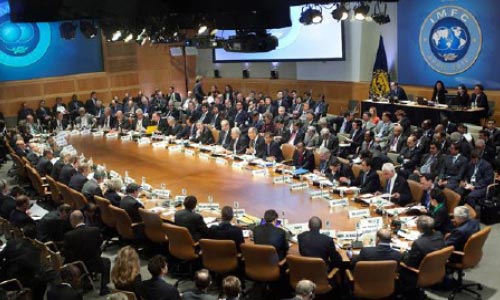KABUL - Afghanistan will receive a disbursement amount worth $6.2 million under the Extended Credit Facility (ECF), the International Monetary Fund (IMF) announced on Saturday.
The IMF Executive Board completed the fourth review of Afghanistan’s economic programme. The latest disbursement will bring total disbursements to about $31.2 million.
The three-year ECF arrangement for SDR 32.38 million (or 10 percent of Afghanistan’s quota at the time of approval of the arrangement) was green-lighted on in July 2016.
A statement from IMF said the Executive Board also approved Kabul’s request to extend the arrangement to end-December 2019 and modify performance criteria on net international reserves and net credit to government.
The extension ensures uninterrupted engagement with the Fund through the election year and provides time for the completion of the sixth review and implementation of additional reforms.
The poor security situation, election-related political uncertainty and a severe drought are undermining confidence and growth. However, programme implementation was satisfactory despite the challenging environment, the statement added.
Following the Executive Board discussion, Mitsuhiro Furusawa, deputy managing director and acting chair, made the following statement:
“The government of Afghanistan, guided by the Afghanistan National Peace and Development Framework and supported by the IMF ECF arrangement, remains committed to implementing policies ensuring macroeconomic stability and socially-balanced structural reforms in pursuit of self-reliance, inclusive growth and poverty reduction.
“The insurgency, regional risks, and uncertainty during the electoral cycle compounded by a devastating drought are clouding the outlook.
“The authorities’ macroeconomic policy mix maintaining fiscal and external stability with low inflation and a flexible exchange rate is appropriate going forward in view of the many challenges facing the country.
“Fiscal policy should focus on sustainability considering risks to revenues and grants and limited financing options. Fair and sustainable domestic revenue mobilization for development needs while protecting pro-poor and pro-growth spending remains a priority.
“Public financial and investment management should benefit from the newly adopted supportive laws. Policy initiatives should consider good global practices in consultation with the IMF and the international partners.
“Continued financial sector reforms are critical for banking sector stability. Strengthened crisis preparedness, strict monitoring of weak private banks, and state-owned commercial banks’ reform are priorities. The restoration of the central bank’s balance sheet is on track and should continue, while the recovery of stolen Kabul Bank assets should be reignited.
“The anti-corruption agenda, including criminalizing corruption and adopting a law on asset declarations by public officials, has advanced, and needs rigorous enforcement to build confidence.
“Strong program implementation demonstrated by completion of this fourth review remains vital to the success of the reforms fostering inclusive growth in a difficult political and security environment. Continued support of the donor community is critical for Afghanistan’s successful transition to self-reliance. The IMF stands ready to continue to assist Afghanistan through policy advice and capacity development.” (Pajhwok)
Home » Afghanistan » IMF to Give Kabul $6.2m Under ECF Programme
IMF to Give Kabul $6.2m Under ECF Programme

